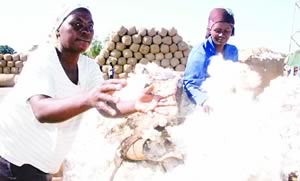
Zimbabwe cotton farmers earned from this year's yield according to a recent article in the state newspaper The Herald. The land redistribution program in this Southern African state has provided farms to people dispossessed by colonialism., a photo by Pan-African News Wire File Photos on Flickr.
Farmers pocket US$140m
Monday, 27 June 2011 01:00
Zimbabwe Herald
Cotton workers grade cotton at a depot in Sanyati
By George Chisoko
CLOSE to US$140 million has gone into the pockets of cotton farmers countrywide from the sale of 160 million kg of seed cotton, as the Zimbabwe Farmers' Union yesterday implored big ginners to emulate small players that are paying much more than the minimum price.
Ginners have been buying cotton at an average price of 85US cents per kg, which is almost a 183 percent increase on last season's price of 30 US cents per kg.
During the same period last year, farmers sold 92 million kg of seed cotton at an average price of 30 US cents/kg, earning them US$27,6 million.
Cotton Ginners Association chairman David Machingaidze, in an interview at the weekend said the increase in seed cotton sales and the direct cash windfall to rural areas bodes well for the future of seed cotton production.
President hails black farmers
"We are seeing growing interest in cotton production dovetailing well with our vision to see farmers producing 1 million tonnes of seed cotton. We have seen the livelihoods of cotton farmers generally improving on the back of high prices they are being paid for their seed cotton.
"There has indeed been massive economic empowerment of the rural farmers but we believe that going forward, farmers' need to increase yield levels to hedge against the eventuality of prices dropping as is the case at the moment.
"Farmers should always sell their crop early. The world lint price is continuing to drop, from 237 cents per pound at the start of the selling season to the current 145 cents per pound, which is a decrease of 40 percent.
"Although the minimum seed cotton price is down to 75 US cents/kg, as ginners we are still paying 85 US cents/kg, which shows that competitive forces are working in the farmers' favour. There are very strong market forces at play that have kept the price above the minimum,'' said Machingaidze, who is also the managing director of Cottco.
Zimbabwe Farmers' Union vice president Berean Mukwende said the union was happy with the price ginners were paying for the seed cotton, but admitted much more still needs to be done for farmers to get the true market value of their cotton.
"Yes, we are happy with the cash windfall into the rural areas but we believe the price being paid at the moment is not the final price.
We agreed with the ginners to review the price in November when they exported. There are some companies that are already paying between 90 US cents and US$1/kg and we want to urge big companies like Cottco and Cargill to also push their price up. Generally, we want to see both the farmers and merchants benefiting for the greater good of the industry, '' said Mukwende.
According to SA Cotton, prices in that country are ranging from US$1,40 to US$1,80 per kg while in Malawi ginners are buying at US$1,20/kg.
The Government has also gazetted a Cotton Development Levy that would be paid by ginners towards research and training. The major problems in the industry have not been pricing but yield levels.
There is need to bring yields up, since that is the quickest way of growing the crop. The crop volume should be increased from the existing hectarage and this is what the levy seeks to address. Yield levels range between 600 and 700 kg/hectare against the ideal yield levels of between 1 200 and 1 500 kg/hectare.
The current 300 000 tonnes fall short of meeting the installed gin capacity that stands at 700 000 tonnes. Ginners have thus been operating at 43 percent capacity.
No comments:
Post a Comment